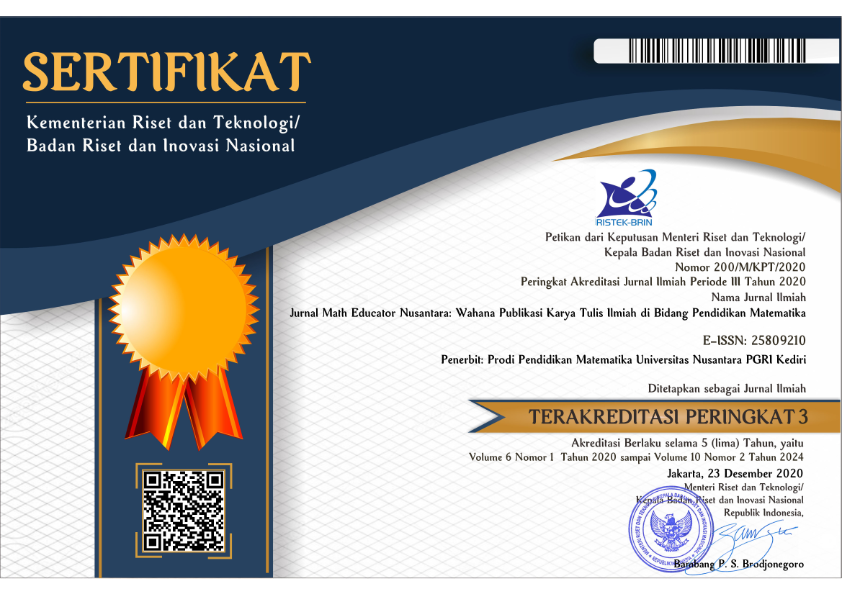Analysis of student needs of the mathematics club (MC) as a co-curricular activities as an effort to grow up 4C skills
Abstract
In the industrial revolution 4.0, 4C’s skills (critical thinking, creative thinking, collaboration, and communication) are essential for the students. Therefore, starting from elementary school, these skills need to be cultivated. According to Permendikbud No. 23 of 2017, there are 3 activities that must carry out, namely intra-curricular, co-curricular, and extra-curricular. Like intra-curricular activities, co-curricular activities should be structured and systematic as intra-curricular that have teaching material. However, the reality is a lot of school don’t have a good preparation for doing co-curricular. Co-curricular is the activities of deepening the material (indicator) there are in intra-curricular, so the material presented in co-curricular activities must be the material that is difficult or that needs enrichment. One of the materials that requires enrichment is mathematics. It is because mathematics has contained difficult material and is usually feared by the students. This article will specifically discuss the needs of students in full-day schools whose co-curricular activities in Mathematics Club (MC) are an cultivate 4C’s skills. The method used exploratory research method. The result of this research found that Schools needed activities such as Mathematics Club because the schools had not implemented cocurricular activities optimally.
Di era revolusi industry 4.0, keterampilan 4C (critical thinking, creative thinking, collaboration, and communication) penting untuk dimiliki siswa. Oleh karena itu, mulai dari tingkat sekolah dasar, kemampuan ini perlu ditumbuhkan. Sesuai Permendibud No 23 tahun 2017 terdapat 3 kegiatan yang harus dilakukan sekolah yakni intrakurikuler, kokurikuler, dan ekstrakurikuler. Layaknya kegiatan intrakurikuler, kegiatan kokurikuler seharusnya juga tersusun secara terstruktur dan sistematis disertai dengan bahan ajarnya. Namun, kenyataannya sekolah belum memiliki kesiapan yang maksimal terkait dengan perancangan dan pelaksanaan kegiatan kokurikuler tersebut. Kegiatan kokurikuler adalah kegiatan pendalaman materi (indikator) yang ada dalam kegiatan intrakurikuler, jadi materi yang disajikan dalam kegiatan kokurikuler haruslah materi yang sulit atau butuh pengayaan. Salah satu materi yang membutuhkan pengayaan adalah materi matematika. Hal ini dikarenakan matematika selalu menjadi materi yang sulit dan ditakuti siswa. Artikel ini secara spesifik akan membahas kebutuhan siswa di sekolah full day terhadap kegiatan kokurikuler mathematics club sebagai upaya menumbuhkan keterampilan 4C. Metode yang digunakan dalam penelitian ini adalah metode penelitian eksploratif dimana peneliti melakukan observasi dan wawancara secara mendalam terhadap kebutuhan sekolah terhadap kegitan kokurikuler Mathematics Club. Hasil penelitian menemukan bahwa sekolah membutuhkan kegiatan seperti Mathematics Club karena sekolah belum menerapkan kegiatan kokurikuler secara maksimal.
References
Arsyad, R. Bin, & Hakim, A. (2019). Diagnosis Kesulitan Penyelesaian Soal Matematika Pokok Bahasan Pecahan pada Siswa SD Muhammadiyah 2 Kota Sorong. Qalam : Jurnal Ilmu Kependidikan. https://doi.org/10.33506/jq.v8i1.474
Ermayani, L., Suarjana, I. M., & Parmiti, D. P. (2019). Analisis Kemampuan Siswa dalam Menyelesaikan Soal Pecahan Sederhana. Jurnal Pedagogi Dan Pembelajaran. https://doi.org/10.23887/jp2.v1i1.19325
Knight, D. B., & Novoselich, B. J. (2017). Curricular and co‐curricular influences on undergraduate engineering student leadership. Journal of Engineering Education, 106(1), 44-70.
Maulana, M. dan S. (2018). Analisis Kebutuhan Lembar Kerja Siswa Berpendekatan Matematika Realistik Untuk Siswa Kelas VIII. Prosiding Seminar Nasional Etnomatnesia, 22, 367–371. http://jurnal.ustjogja.ac.id/index.php/etnomatnesia/article/view/2349
Mendikbud. (2017). Permendikbud No 23 Tahun 2017 Tentang Hari Sekolah. Berita Negara Republik Indonesia Tahun 2017 Nomor 829. https://psmk.kemdikbud.go.id/epub/download/Qm0bsKt0F28yttJjlnfVRW2876LRIIQchE3d2RJD.pdf
Miftah, M. (2018). Menakar kebijakan full day school (Studi Analisis Permendikbud No 23 Tahun 2017). Jurnal Perspektif, 2(1), 1. https://doi.org/10.15575/jp.v2i1.14
Mujiwati, E. S., Soenarko, B., Permana, E. P., Sahari, S., Primasatya, N., Hunaifi, A. A., & Aka, K. A. (2020). Pelatihan Pengembangan Program Kokurikuler Bagi Guru SD Laboratorium UN PGRI Kediri. 3(2), 165–172.
Pakaya, W. C., Qohar, A., & Susiswo. (2019). Keterampilan Geometri Siswa Kelas IV Sekolah Dasar Berdasarkan Teori Van Hiele Level Analisis. Journal Pendidikan: Teori, Penelitian, Dan Pengembangan, 4(3), 310–316.
Piaget, J. (2013). The construction of reality in the child. In The Construction of Reality in the Child. https://doi.org/10.4324/9781315009650
Primasatya, N., & Jatmiko, J. (2018). Pengembangan multimedia geometri berbasis teori berpikir van hiele guna meningkatkan kemampuan berpikir kritis siswa kelas V. JIPMat. https://doi.org/10.26877/jipmat.v3i2.2745
Primasatya, N., & Mukmin, B. A. (2020). Validitas multimedia interaktif K13 pada materi pecahan sebagai inovasi pembelajaran tematik bagi siswa Kelas IV. Jurnal Math Educator Nusantara: Wahana Publikasi Karya Tulis Ilmiah Di Bidang Pendidikan Matematika. https://doi.org/10.29407/jmen.v6i1.14195
Putra, A., & Syarifuddin, H. (2019). Analisis Kebutuhan Pengembangan Lembar Kerja Siswa Berbasis Penemuan Terbimbing Kelas VIII Sekolah Menengah Pertama. Jurnal Edukasi Matematika Dan Sains. https://doi.org/10.25273/jems.v6i1.5327
Rivilla, S. R. (2014). Pelaksanaan kokurikuler mental aritmatika sempoa di SDN Landasan Ulin Barat 1 Banjarbaru. Al Adzka. https://doi.org/10.18592/aladzkapgmi.v4i2.291
Ruqoyyah, S. (2018). Meningkatkan Kemampuan Komunikasi Matematik Siswa Ma Melalui Contextual Teaching And Learning. Jurnal Ilmiah P2M STKIP Siliwangi, 5(2), 85-99.
Suhendri dan Suparman. (2018). Analisis Kebutuhan Pengembangan Modul Pembelajaran Matematika Berbasis Guided Discovery untuk Siswa Tunanetra. Prosiding Seminar Nasional Pendidikan Matematika Ahmad Dahlan, 289–294.
Zubaidah, S. (2018). Mengenal 4C: Learning and Innovation Skills untuk Menghadapi Era Revolusi Industri 4.0. 2nd Science Education National Conference, 13 October 2018, 2. https://www.researchgate.net/publication/332469989_MENGENAL_4C_LEARNING_AND_INNOVATION_SKILLS_UNTUK_MENGHADAPI_ERA_REVOLUSI_INDUSTRI_40_1
Authors who publish with this journal agree to the following terms:
1. Copyright on any article is retained by the author(s).
2. The author grants the journal, right of first publication with the work simultaneously licensed under a Creative Commons Attribution License that allows others to share the work with an acknowledgment of the work’s authorship and initial publication in this journal.
3. Authors are able to enter into separate, additional contractual arrangements for the non-exclusive distribution of the journal’s published version of the work (e.g., post it to an institutional repository or publish it in a book), with an acknowledgment of its initial publication in this journal.
4. Authors are permitted and encouraged to post their work online (e.g., in institutional repositories or on their website) prior to and during the submission process, as it can lead to productive exchanges, as well as earlier and greater citation of published work.
5. The article and any associated published material is distributed under the Creative Commons Attribution 4.0 Internasional License







